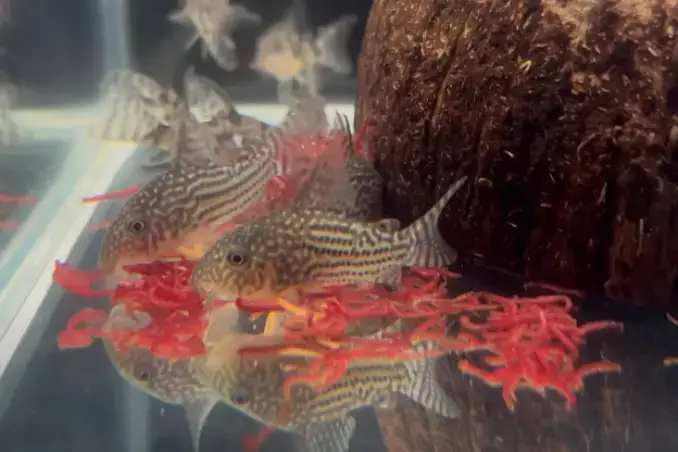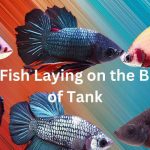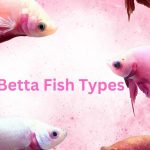To ensure your betta fish stays healthy and happy, it’s important to follow proper feeding instructions. Betta fish are carnivorous and need a protein-rich diet. Providing the right food in the correct amount and at the appropriate time is essential for keeping your betta fish healthy and active.
Bettas don’t need precise amounts of food, but 1.8 grams is recommended per day for adults. You can adjust this amount based on your betta’s individual requirements and the type of food you feed him.

In our discussion of how to feed betta fish, we cover their nutritional requirements, frequency, quantity, and feeding techniques. We also talk about cleaning and maintaining their tanks. In this way, you can help your betta remain healthy by monitoring their eating habits and adjusting their food intake accordingly.
Table of Contents
How Often Should I Feed My Betta?
Overfeeding is a common mistake among betta fish owners, as it can lead to health problems and poor water quality in the tank. It’s important to remember that bettas have small stomachs and are better adapted to consuming multiple smaller portions throughout the day.

Feeding your betta twice daily will ensure that they receive the right amount of food without overfeeding. It’s also important to start with small amounts and adjust as necessary, as every fish is different and may require different feeding amounts.
Remember, the health and well-being of your betta fish depend on proper feeding and care, so taking the time to establish a healthy feeding routine is crucial.
How Much To Feed A Betta Fish
Betta fish need small amounts of food to prevent overfeeding and to remain healthy. You should feed your betta fish small amounts of these foods:
1. Use a small amount of food
When feeding your betta fish, use only a small amount of food that can be consumed in 2-3 minutes. You can use your fingers or a small spoon to measure the amount of food you are giving to your betta.

2. Feed two to three times a day
Instead of giving your betta fish a large amount of food once a day, divide their daily food allowance into two to three smaller feedings. This will ensure that your betta fish is getting enough food without overfeeding.
3. Observe your betta fish
You should keep an eye on your betta fish as they eat to find out how much they consume. If they are leaving any uneaten food behind, reduce the amount of food you are feeding them at each meal.
4. Don’t feed them treats too often
Your betta fish can benefit from live or frozen foods like bloodworms or brine shrimp, but these foods should be given as treats instead of being part of their regular diet. Overfeeding on treats can lead to obesity and health problems.
5. Remove uneaten food
After a few minutes, remove any uneaten food from the tank to prevent it from polluting the water and causing health problems for your betta fish.
Overfeeding is Risky
Excess food can also cause a buildup of waste and harmful bacteria within the tank if it is overfed. This can harm not only your betta fish but also other fish and aquatic life in the tank.
Furthermore, overfeeding can cause your betta to become lazy and lethargic, as their body will prioritize digestion over other activities. This can lead to a lack of exercise and muscle loss, which can further weaken the fish’s overall health and immune system.
It’s important to follow proper feeding guidelines and not to overfeed your betta fish. You can ensure their health and happiness by feeding them moderately and monitoring their weight and activity level.
What Types of Food Should You Feed Your Betta Fish?
Betta fish are carnivores, and their diet should consist primarily of protein-rich foods. There are several types of food that you can feed your Betta fish, including:
- Pellets: Pellets are the most common food for Betta fish and are available in many different varieties. Look for high-quality pellets that contain at least 40% protein. Feed your betta fish the number of pellets equivalent to the size of one of its eyeballs for one meal, ranging from 2-12 pellets depending on the size of the pellets and your fish’s anatomy. Split the feeding into two halves if you need to feed more than eight pellets and ensure your betta finishes all the food within five minutes.
- Flakes: Flakes are another common food for Betta fish, but they are not as nutritious as pellets. If you choose to feed your Betta fish flakes, look for ones that are specifically formulated for Betta fish.

- Live food: Betta fish enjoy live food, such as brine shrimp, daphnia, and bloodworms. Live food should be used as a treat and not as a staple food source.
- Frozen food: Frozen food, such as bloodworms and brine shrimp, is a convenient alternative to live food. However, frozen food should be thawed before feeding to prevent digestive issues.
What to Feed Betta Fish?
Betta fish are carnivorous and thrive on a high-protein diet. The best food for betta fish is high-quality betta pellets or frozen/live foods such as brine shrimp, bloodworms, or daphnia. It’s important to avoid overfeeding your betta fish as it can lead to health problems such as constipation and obesity.
The amount of food you should feed your Betta fish depends on several factors, including their age, size, and activity level. As a general guideline, Betta fish should be fed an amount of food they can consume within two minutes.
For pellets, feed your Betta fish one to three pellets per meal. For flakes, feed them a small pinch. For live or frozen food, feed them the amount that they can consume within two minutes. Betta fish can eat a wide variety of foods such as:
- Betta Pellets
- Betta Flakes
- Bloodworms
- Brine Shrimp
- Daphnia
- Mysis Shrimp
- Tubifex Worms
- Mosquito Larvae
Betta fish owners should stick to pellets formulated for their fish and use special foods only as treats or supplements. The diet of an experienced fishkeeper might include richer foods more frequently. A wide variety of specialty fish foods are available in freeze-dried, frozen, and live formats.
Pros and Cons of Feeding Your Betta Fish Live Food
Live food is a popular choice for betta fish owners, but it’s important to understand the pros and cons before making any decisions.
Pros:
- Live food is high in protein, which is essential for betta fish growth and health.
- Live food can provide mental stimulation and help prevent boredom in betta fish.
- Live food can replicate the natural diet of betta fish, which can lead to better overall health.
Cons:
- Live food can be expensive and difficult to find.
- Live food can introduce harmful bacteria or parasites to your betta fish tank.
- Overfeeding live food can cause health problems for your betta fish.
What Do Betta Fish Eat? Best Betta Fish Food Options
It’s time to take a look at some of the best options for live food for betta fish now that you know its pros and cons. Here are some best betta food options:
- We decided to take a closer look at some of the best food for betta fish available to find the best brands out there. Of the many brands we’ve seen, these are the best betta food to buy in 2023:
- Best Betta Food Overall: Fluval Bug Bites
- Best Betta Pellets: Tetra Betta Floating Mini Pellets
- Best Betta Fish Flakes: Omega One Betta Flakes
- Best Freeze-Dried Betta Food: Tetra BloodWorms
Each of these live foods has its own unique benefits, so it’s important to do your research and choose the best option for your betta fish.
Can Betta Fish Eat Human Food?
While betta fish may enjoy some of the same foods as humans, like shrimp, their carnivorous diet means not all human foods are suitable for them. Bread and fruit are definite no-nos, while vegetables like peas, lettuce, or cucumbers may be given as occasional treats.
Although bettas may eat small amounts of cooked meat or other fish, it’s best to avoid these options and stick to specially formulated betta food to ensure optimal health.
How to Fast Your Betta
You can improve your betta’s digestion and overall health by fasting them. Betta fish can go without food for several days without experiencing any harm, so periodic fasting can help prevent overfeeding and bloating.
Fasting your betta for one day a week is a good practice to help regulate digestion and prevent constipation. You can also fast your betta for a day or two before introducing new types of food or changing your feeding routine.
During fasting periods, it’s important to make sure your betta still has access to clean water and a healthy environment. Remember to resume feeding your betta as normal after fasting periods, and never fast for extended periods of time as this can lead to malnutrition and other health issues.
Can my Betta go Without Food for a Long time?
Betta fish can survive for up to two weeks without food, but it isn’t recommended to do so. However, it is important to remember that bettas require proper nutrition to maintain their health and well-being even when they go without food for a few days.
You can purchase automatic feeders for your betta if you plan on being away for a few days, or you can have someone come over and feed it for you.
You may want to arrange for someone to take care of your betta if you are going to be away for an extended period of time. Whatever you do, don’t overfeed your betta before leaving, as this can cause issues with water quality and health. You can keep your betta healthy and happy by making sure it’s fed properly, even when you’re not around.
FAQs
1. Can You Feed Your Betta Tropical Fish Food?
Tropical fish food is designed for a variety of fish species, so it may not provide the specific nutrients that betta fish need. In addition, many tropical fish foods contain fillers that can be harmful to betta fish.
If you want to ensure that your betta fish is getting the proper nutrition, it’s best to stick to live food or betta-specific pellet food
2. What Are the Signs of Overfeeding?
Overfeeding your Betta fish can lead to several health issues, including:
- Obesity: Betta fish that are overfed can become obese, which can lead to other health issues.
- Constipation: Betta fish that are overfed can become constipated, which can lead to swim bladder issues.
- Poor water quality: Overfeeding can lead to an excess of food in the tank, which can lead to poor water quality.
3. What Are the Signs of Underfeeding?
Underfeeding your Betta fish can lead to malnutrition and several health issues, including:
- Lethargy: Betta fish that are underfed may become lethargic and lose their appetite.
- Weight loss: Betta fish that are underfed may lose weight and become weak.
- Poor immune system: The immune system of betta fish that are underfed may be compromised, making them more prone to disease.
4. What Do Betta Fish Eat?
Betta fish are carnivorous fish that naturally consume live insects, small bugs, and larvae. They need a diet that is high in protein and contains the essential nutrients they need.
5. What do they eat in the wild?
In their natural habitat, betta fish consume live insects, small bugs, and larvae as they are carnivorous in nature. Their diet primarily consists of high protein and essential nutrients. Although betta fish can survive on a vegetarian diet for a while, it cannot provide them with the necessary nutrients for their overall well-being.
Final Words on How to Feed Your Betta
However, it’s important to keep in mind that different bettas have different dietary needs based on their age, size, and activity level. Always monitor your betta’s weight and adjust their feeding regimen as necessary.
Remember to feed your betta a high-quality, protein-rich diet, divide their rations into two small meals per day, and clean up any uneaten food promptly. By taking these simple steps, you can help ensure the health and well-being of your beloved betta fish.






